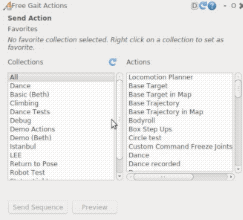Free Gait
An Architecture for the Versatile Control of Legged Robots
NOTICE: This software is not supported anymore! The authors of this software have changed their affiliation and do not work on this project anymore. Please excuse any inconvenience this might cause. If you are interested in working with the ANYmal robot, please reach out to ANYbotics.
Free Gait is a software framework for the versatile, robust, and task-oriented control of legged robots. The Free Gait interface defines a whole-body abstraction layer to accommodate a variety of task-space control commands such as end effector, joint, and base motions. The defined motion tasks are tracked with a feedback whole-body controller to ensure accurate and robust motion execution even under slip and external disturbances. The application of this framework includes intuitive tele-operation of the robot, efficient scripting of behaviors, and fully autonomous operation with motion and footstep planners.
The source code is released under a BSD 3-Clause license.
Author: Péter Fankhauser
With contributions by: Samuel Bachmann, Dario Bellicoso, Thomas Bi, Remo Diethelm, Christian Gehring
This projected was initially developed at RSL, ETH Zurich.
Publications
If you use this work in an academic context, please cite the following publication(s):
-
P. Fankhauser, D. Bellicoso, C. Gehring, R. Dubé, A. Gawel, M. Hutter, "Free Gait – An Architecture for the Versatile Control of Legged Robots", in IEEE-RAS International Conference on Humanoid Robots, 2016. (PDF)
@inproceedings{Fankhauser2016FreeGait, author = {Fankhauser, P{\'{e}}ter and Bellicoso, C. Dario and Gehring, Christian and Dub{\'{e}}, Renaud and Gawel, Abel and Hutter, Marco}, booktitle = {IEEE-RAS International Conference on Humanoid Robots}, title = {{Free Gait – An Architecture for the Versatile Control of Legged Robots}}, year = {2016}, }
Unit Tests
catkin build free_gait_core --no-deps --verbose --catkin-make-args run_testsOverview
This video shows some of the applications of Free Gait.
Usage
This video presents an overview over the tools provided in Free Gait.
Free Gait Actions
Free Gait actions are libraries and scripts that define motions using the Free Gait API (for ROS ). For ROS, these actions can be write in any language with a ROS client library using the message and action definitions in free_gait_msgs. For C++, Free Gait provides the free_gait_core library to work with motion definitions and the free_gait_ros for interfacing ROS. To work with Python, use the free_gait_python library. For simple motion definitions, Free Gait supports actions defined in YAML format. For more information about using YAML actions, refer to YAML Scripting Interface.
Free Gait commands are expressed as a combination of leg (in joint or end-effector Cartesian space) and base motions with definition of position, velocity, and/or force/torque targets or trajectories.
| Target | Trajectory | Automatic | |
|---|---|---|---|
| Leg motion in joint space | JointTarget | JointTrajectory | LegMode |
| Leg motion in Cartesian space | EndEffectorTarget | EndEffectorTrajectory | Footstep |
| Base motion | BaseTarget | BaseTrajectory | BaseAuto |
Free Gait actions can be either launched manually or with help of the free_gait_action_loader.
Free Gait Action Loader
The free_gait_action_loader allows to launch actions through a ROS service or ROS action. Currently, the action loader supports YAML motion definitions, Python scripts, and starting ROS launch files for C++ and other libraries.
Run the free_gait_action_loader with
rosrun free_gait_action_loader action_loader.pyThe free_gait_action_loader manages the actions and makes sure that only one action is running at the time. To register an action with the free_gait_action_loader, one has to load the action as a ROS plugin.
RQT Free Gait Action
The rqt_free_gait_action package provides a rqt user interface to the free_gait_action_loader. The interface shows the actions organized in collections and allows to preview and send the actions. Additionally, collections can be run as sequence of actions and with a right-click, a collection can be selected as favorite. Favorites are shown as buttons on the top for quick access.
RQT Free Gait Monitor
Once actions are being executed by the Free Gait action server, the rqt_free_gait_monitor shows the progress of the execution and allows to pause and stop the active action.
Free Gait RViz Plugin
Actions can be previewed with the free_gait_rviz_plugin. It takes the current state of the robot and visualizes the motion based on the defined action. This RViz plugin allows to scrub through time and visualize footholds, trajectories, support polygons etc.
YAML Scripting Interface
For simple motion sequences, Free Gait actions can be defined as a sequence of YAML definitions.
For example, this action lifts the right-fore leg of the robot:
adapt_coordinates:
- transform:
source_frame: footprint
target_frame: odom
steps:
- step:
- base_auto:
- step:
- base_auto:
- end_effector_target:
name: RF_LEG
ignore_contact: true
target_position:
frame: footprint
position: [0.39, -0.22, 0.20]The adapt_coordinates command transforms motions defined in the source_frame to the target_frame.
FAQ
Actions Are Not Found
If no Free Gait actions are found/loaded, this service call will return empty:
rosservice call /free_gait_action_loader/list_actions "collection_id: ''"In this case, try initializing rosdep with:
sudo rosdep init
rosdep update






